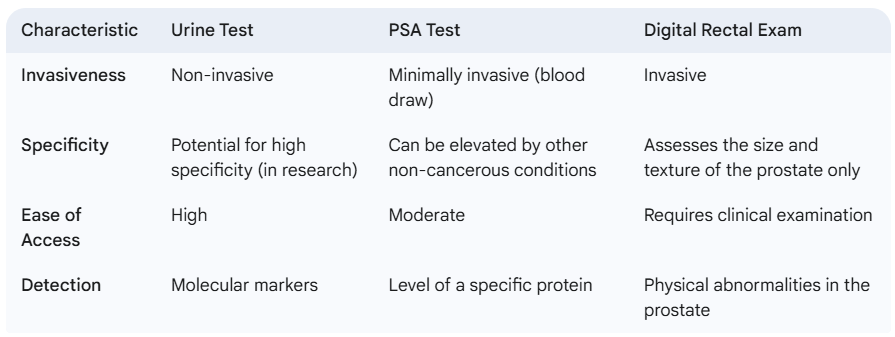Prostate cancer is one of the most common forms of cancer affecting men worldwide. The key to successful treatment and increasing the chances of a cure lies in the early detection of the disease. Traditionally, this detection involves the PSA (Prostate-Specific Antigen) test and the digital rectal exam, methods that, despite their importance, have limitations. Now, a promising new approach is emerging on the horizon: the urine test for the early detection of prostate cancer, offering a less invasive and potentially more specific alternative.
How Does the Urine Test Work?
The urine test for prostate cancer detection involves analyzing urine samples to identify biological markers that may indicate the presence of cancerous cells in the prostate. These markers can include:
Expression of specific genes: Some tests look for abnormal patterns in the expression of genes that are often altered in prostate cancer cells. For example, they may detect the presence of messenger RNA (mRNA) from genes associated with cancer.
Specific proteins: Other tests focus on detecting proteins that are overproduced or altered in men with prostate cancer.
Metabolites: Certain tests may analyze metabolites present in the urine that are characteristic of cancerous activity.
Collecting the urine sample is a simple and non-invasive procedure, which represents a significant advantage over traditional methods.
Benefits of Early Detection
Early detection of prostate cancer is crucial for several reasons:
Higher cure rates: When cancer is diagnosed in its early stages, treatment options are more effective, and the chances of a cure are significantly higher.
Less need for aggressive treatments: Early detection may allow for the use of less invasive therapies, preserving the patient’s quality of life.
Better quality of life: Preventing the progression of the disease to advanced stages helps maintain quality of life and reduces the impact of more severe symptoms.
The urine test has the potential to facilitate this early detection in a more accessible and acceptable way for men.
Stage of Test Development
Research on urine tests for prostate cancer detection has advanced significantly in recent years. While some tests are already commercially available in certain markets, many are still in the clinical trial and validation phase. It is important to note that the accuracy and specificity of these tests may vary, and research continues to improve their effectiveness and determine the best timing and population for their use.
Comparison with Traditional Detection Methods

The urine test offers the advantage of being non-invasive and has the potential to be more specific for prostate cancer than the PSA test. While PSA levels can be elevated by benign conditions such as benign prostatic hyperplasia or prostatitis, urine tests focus on markers more directly linked to cancer cells. The digital rectal exam provides information about the size and texture of the prostate, complementing other forms of detection.
Conclusion
The urine test represents a promising frontier in the early detection of prostate cancer. Its non-invasive nature and the potential to identify specific markers of the disease may lead to more effective screening and more accurate diagnoses at earlier stages. As research continues and these tests become more refined and widely available, they could play a crucial role in improving outcomes for men at risk of prostate cancer, offering new hope in the fight against this disease.
Natural Alternative: Learn more

